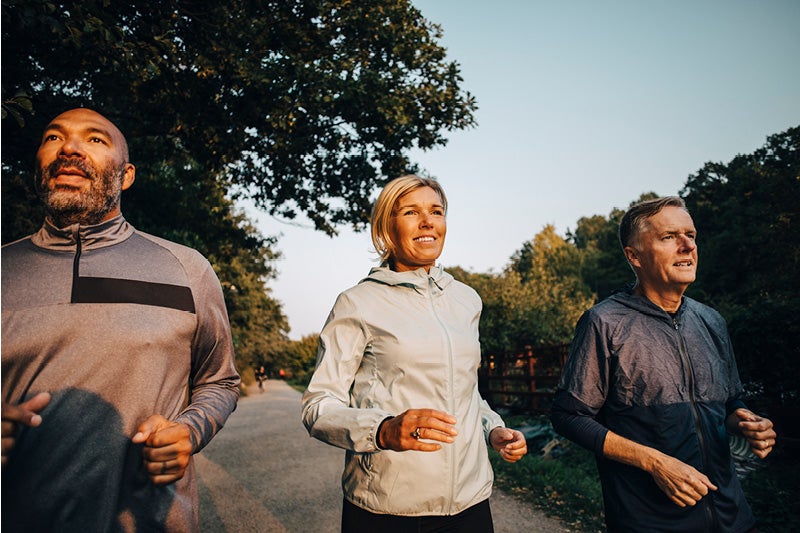
Overview: Many of us know someone who has had a stroke, which makes us consider our own risks. Knowing your risks and tips for prevention may help you avoid this health condition.
If you know someone who has had a stroke, chances are you’ve asked yourself this question. One way to quickly understand your risk is to take our MercyOne stroke health risk assessment.
What are the risk factors I can control?
The biggest risk factors for stroke include high blood pressure, heart disease, diabetes, smoking and a history of transient ischemic attacks. Other significant risk factors include lack of physical activity, high cholesterol and obesity. The good news is up to 80% of strokes can be prevented through healthy lifestyle changes and managing risk factors.
What risk factors can’t be controlled?
There are some things you can’t control when it comes to your risk of stroke. These include age, gender, family history, race/ethnicity, and a prior stroke or transient ischemic attack (TIA). As you can see, most of these uncontrollable factors are linked to your medical and family history.
What exactly is a stroke?
When the blood flow to the brain is blocked, or a blood vessel bursts and starves the brain of oxygen, a stroke happens.
I'm too young for a stroke, right?
While your risk for a stroke increases as you age, young people have strokes too, often caused by trauma and/or genetic conditions, such as vessel malformations. Also, young people need to consider lifestyle and current health conditions, such as high blood pressure, obesity, smoking, alcohol use and family history.
Does family history matter?
Definitely. If there is a history of stroke in your family, particularly if your biological parent had a stroke before age 65, your risks are higher. Be sure to note the history of stroke in your family history with your primary care provider.
Does diet and exercise matter?
Yes. Maintaining a healthy diet rich in vegetables, fruit, whole grains and lean protein is vital. Limit saturated fats, sugar, trans fats and salt. Regular exercise is recommended, so try to get 150 minutes of physical movement throughout each week.
What about stress?
While stress does not directly impact your risk for a stroke, it can make the heart work harder, and that increases blood pressure, as well as sugar and fat levels in the blood. These issues can increase the risk of clots forming and traveling to the brain.
Does having high blood pressure or a history of heart issues make a difference?
If you're diagnosed with high blood pressure, make the necessary medical and lifestyle changes to reduce your risk of stroke. If you have atrial fibrillation, it can increase your risk of a stroke. Is there a history of high blood pressure in your family? Be sure to tell your primary care provider so they monitor yours closely.
Does my gender make a difference?
Men and women alike can suffer strokes. However, according to the American Stroke Association, stroke is the third most common cause of death of women. Some reasons may be if women are taking birth control pills, hormone replacement therapy, are pregnant or have preeclampsia.
What can I start doing today to prevent my risk of stroke?
There are eight important ways to prevent a stroke.
- Exercise
- Eat a healthy diet
- Manage weight
- Quit smoking/all tobacco products
- Treat high blood pressure
- Control cholesterol
- Manage blood sugar
- Get sleep
What are the signs and symptoms of a stroke?
Some symptoms may not point directly to having a stroke, which may include a sudden severe headache with no cause, dizziness, nausea, fatigue, confusion, shortness of breath and heart palpitations. Other more obvious symptoms could include a drooping face or eyelid, inability to speak or use facial muscles, numbness or tingling on one side of the face and body, slurred speech and double vision.
Additionally, memorize the following acronym: B.E.F.A.S.T. and share it with friends and family.
B: Balance loss
E: Eyesight changes
F: Face drooping
A: Arm weakness
S: Speech difficulty
T: Time to call 911
If you think you or someone around you is having a stroke, time is critical, and you should call 911. Once a stroke starts, quick treatment is vital to recovery. Make your health a priority by getting an annual physical exam with your primary care provider who can help you know and understand your risk factors for stroke.
This blog was medically reviewed by a MercyOne Stroke Specialist.
